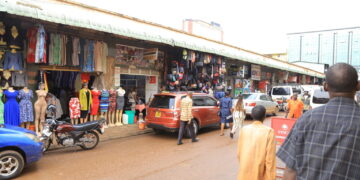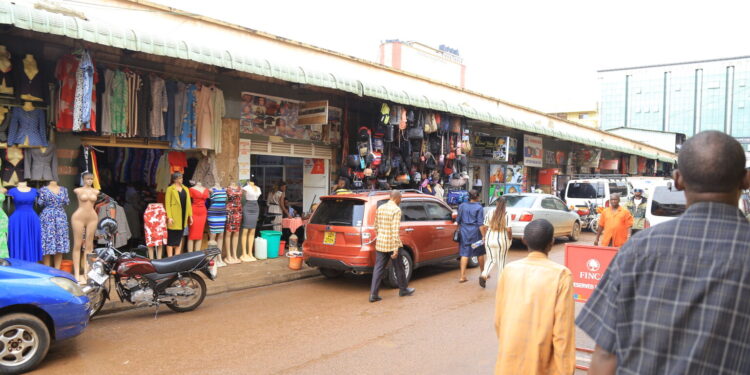Along the bustling Cooper Complex stretch in downtown Kampala, Lingala music plays. On a chilly morning, Mrs Bongo Honoring, 40, prepares to braid one of her client’s hair.
It’s a joyful mood at her salon as customers await their turn. From a childhood marked by war in Congo to becoming a successful hairdresser and salon owner in Uganda, Bongo inspires hope in her family and those around her.
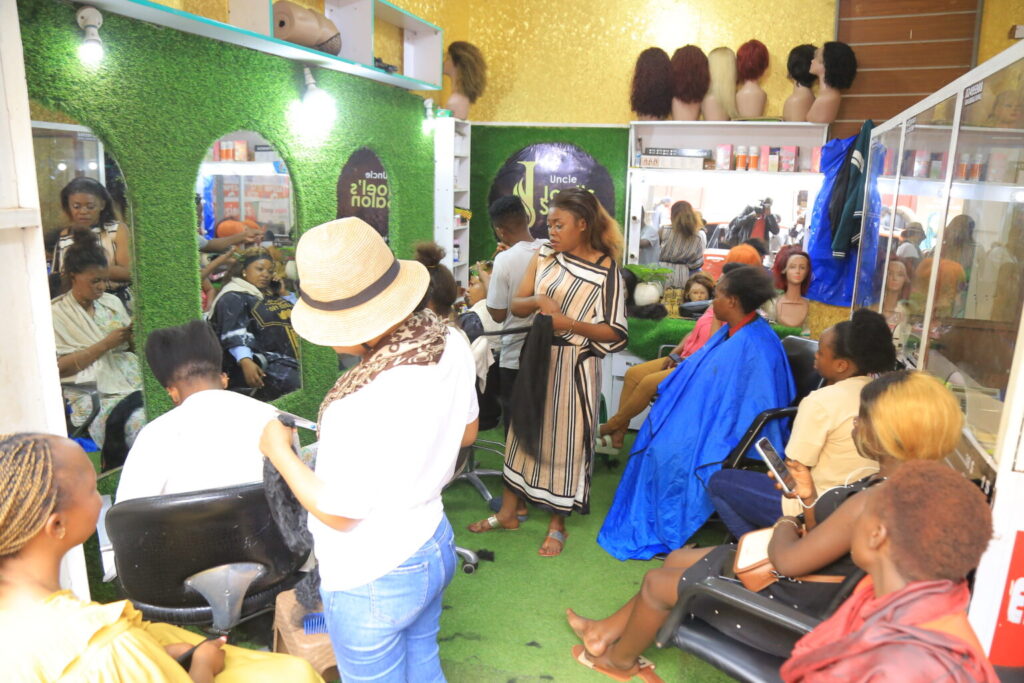
Beauty as a livelihood
Originally from Bukavu, the capital of South Kivu province, DRC, Bongo arrived in Uganda in 2015 from Rwanda through the Bunagana border point in Kisoro district. She stayed in Kisoro for two months until a friend invited her to Kampala and got her a job as a laundry attendant.
There, the language barrier affected her performance… and her dream of a salon job.
“Back home, we all did each other’s hair, so I had learnt the basics of braiding from my family.”
She soon travelled to Jinja in eastern Uganda to develop her hair styling skills. It was easy for her to pick up and practice on her friends’ hair in the evenings. In Jinja, they spoke Swahili, a language she properly understood. This made it easy for Bongo to adapt to the dynamics of the business.
“My dream was to own a salon. I saw it as an opportunity to work for myself,” she explains.
However, returning to Kampala from Jinja was not a bed of roses. One of her employers in the city would pay her peanuts because she could not express herself properly in English.
Listen to Bongo speak:
In 2018, Bongo enrolled for a hairdressing course at the Federation of Beauty and Salon in Kawempe, after which she received a certificate in styling and hairdressing and a workers’ permit. This helped her get a license to operate a salon and train young women interested in the skill.
Over the years, she has amassed a huge following on social media, especially Instagram, where most of her customers found her.
“A customer fell in love with my craft and created this Instagram account for me. After I made her hair so neatly, she begged me to make a video and share it on social media,” Bongo said.
“At the time, my English language was not so good, so I asked her to do it for me. She posted most of my work that day and taught me the whole process of uploading it. Later, I started receiving calls from people who had interacted with my posts, asking for the service, and that was how my Instagram page grew.”
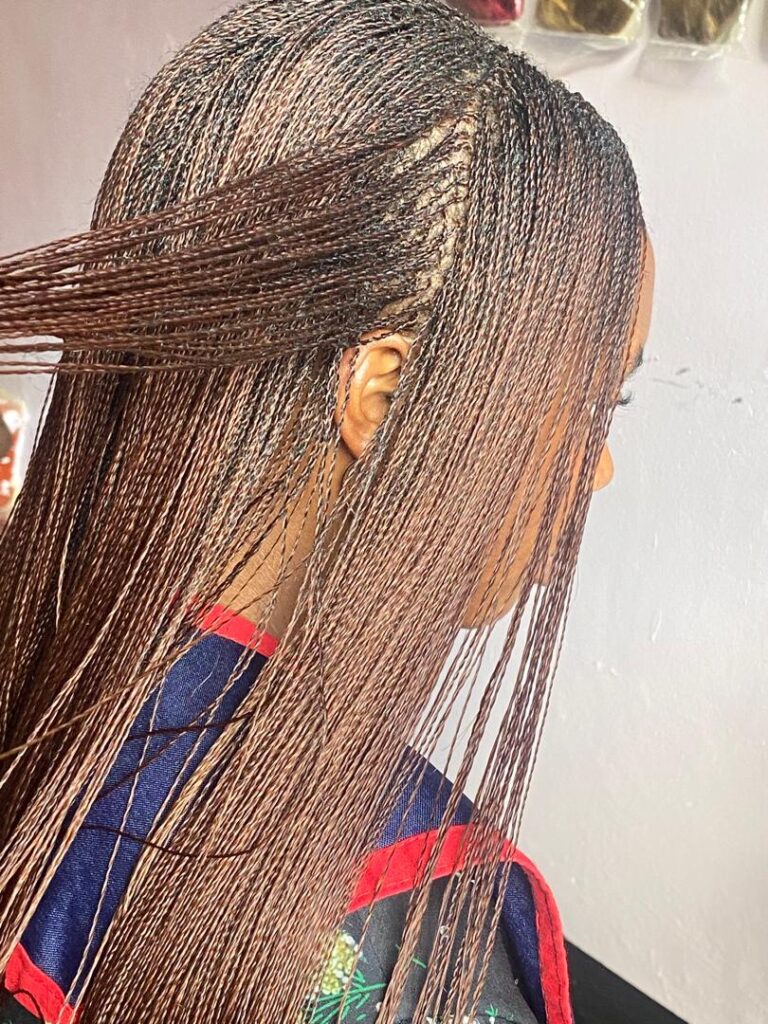
The clients would call and ask for the cost of braiding their hair, book an appointment, and bargain.
For Bongo, her service is more than just a source of income. It’s a source of hope for others. She now employs four full-time and two casual workers.
“My family lives well, and the women I work with are also doing well for themselves.”
About what draws customers to her salon, and those of other Congolese women in the hub, in particular, Mrs. Bongo shares that Congolese braiders are persistent and will go the extra mile to ensure the client is satisfied with the results. They pay attention to detail and make neat braids.
“We give the client’s hair enough time because we want the customer to come back to our salon,” she said.
“When we were still in Congo, people used to say that Ugandan hairdressers only know the treatment of hair but not braiding. I came to Uganda to exploit this opportunity, and now, I have both skills.”
Due to the rush for Congolese braiding in the complex, Bongo can save each month after covering all the salon’s expenses and providing for her family.
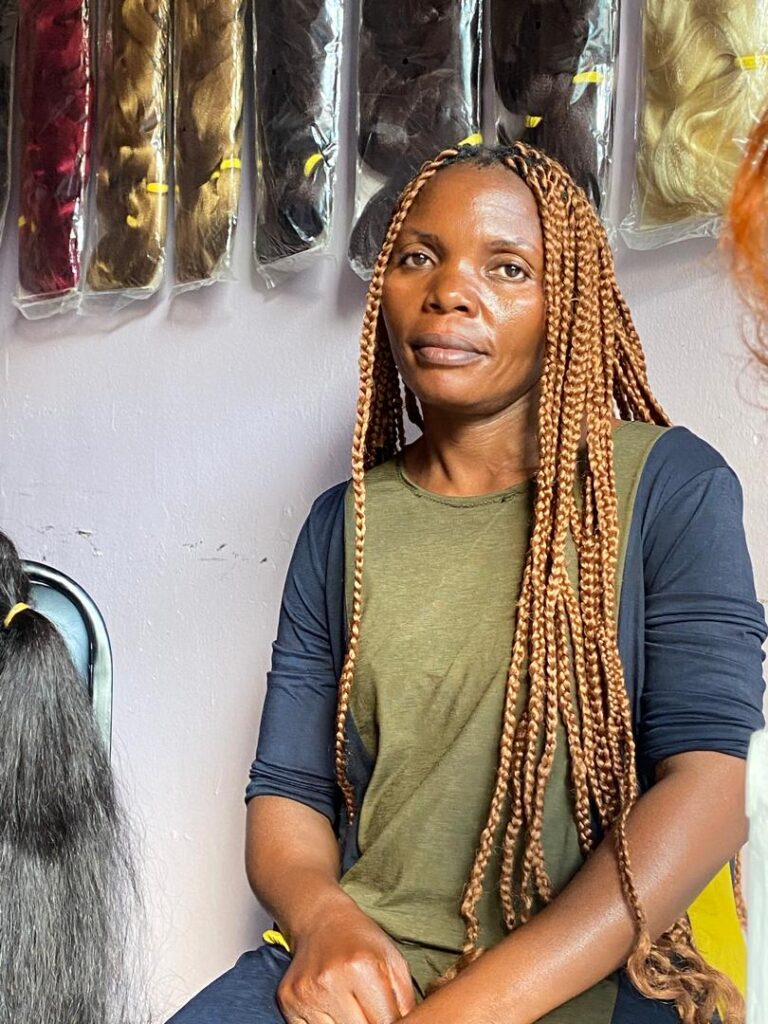
Maria Flora Tumisiime is a Ugandan employee at Uncle Joel’s salon, and she is so far the best box braider at the salon. Bongo introduced her to the style of neat diagonal square sections woven into natural hair using hair extensions that vary in colour and length.
“I am very grateful to Honor for what I am today. I wanted to learn about hairdressing and beauty so that I could earn an income and support my children,” says Flora. However, she couldn’t afford beauty school.
“When I came to Uncle Joel’s salon, I could only shampoo customers’ hair, but Honor trained me on how to plait all braid hairstyles in eight months. It was a tough time, but I was invested.
“We are now like family here. We help each other out with everything.”
Flora describes Mrs Bongo as a very patient and innovative person who always finds a way to the customer’s heart. The 30-year-old mother of three is now a super braider at the salon. The skill she acquired from Mrs. Bongo has enabled her to support herself and her children.
Congolese fashion culture influences
The beautifully chaotic kitenge fabric is a common sight in the streets of Kampala, Uganda.
Pieces with striking colours and patterns meet the eye as the Congolese traditional attire has gained popularity in the country over the years. The elite Ugandan and Sudanese women, in particular, have adopted the fabric and the elegant bazin style.
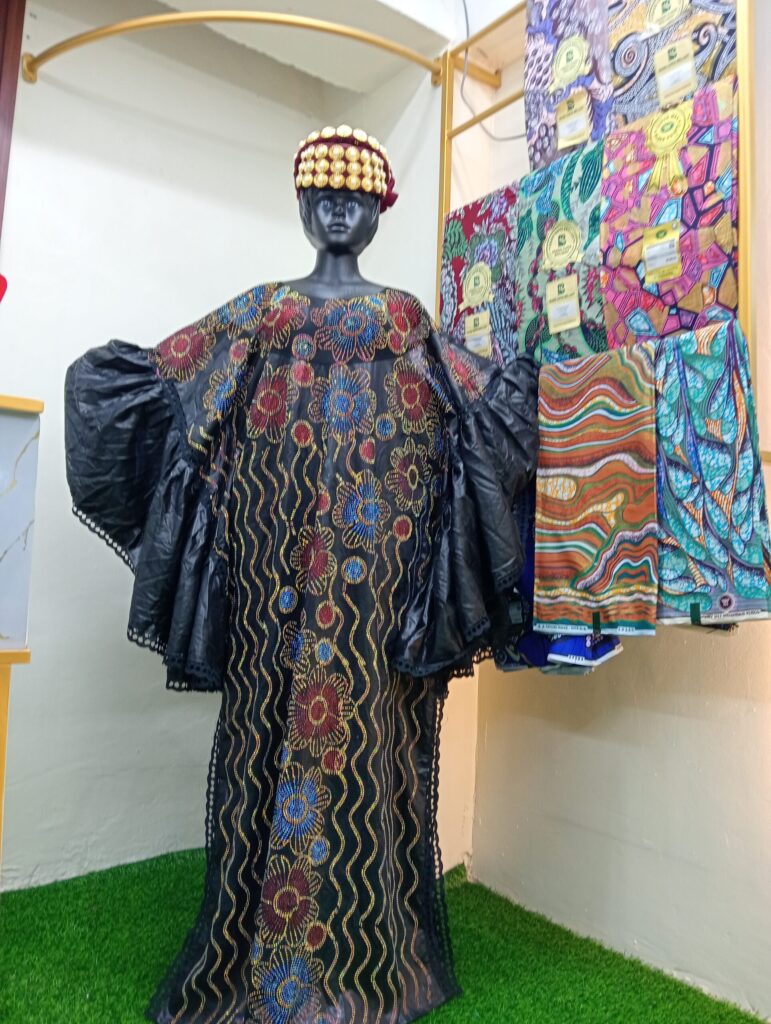
Anifa Asobwe, commonly known as Mama Neema, a stylist and trader of modern bazin and kitenge styles from Kinshasa, the capital city of the DRC, was inspired to open her shop to honour her mother’s legacy.
Growing up, she loved to see herself looking beautiful.
“This way of dressing aligns with my culture. In Congo, women wear long clothing as a sign of dignity,” Asobwe said. Her shop’s name, Urembo, expresses Mama Neema’s desire for style and elegance.
For 15 years, Mama Neema has managed to sustain her life and send money back home to Kinshasa for her siblings’ education.
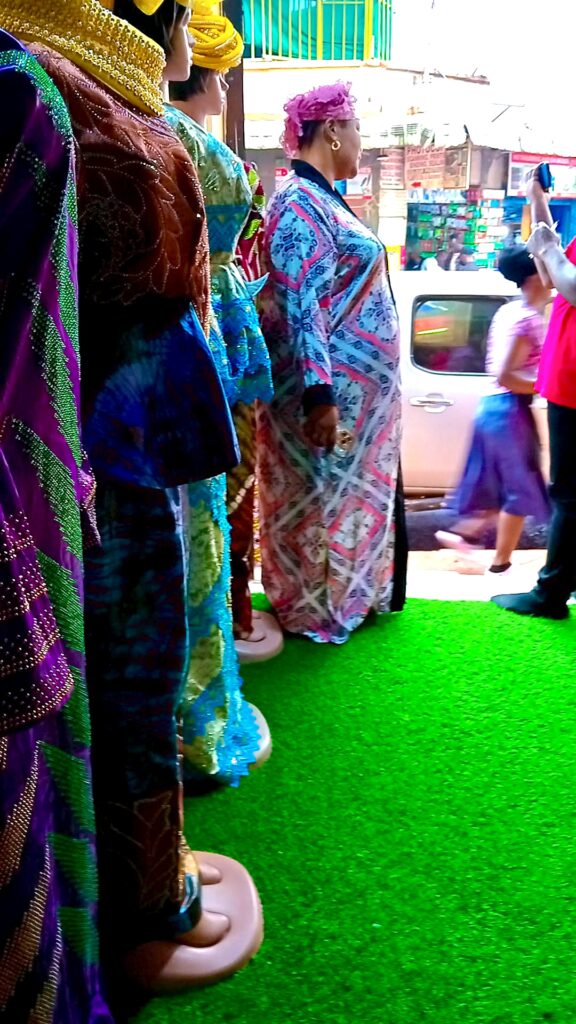
Mama Neema sources her beautiful kitenge from Kinshasa, DRC, and the bazin from Benin, Nigeria, Mali and Senegal. They are in high demand to wear to weddings, special holidays and celebrations at the workplace, for prestige. The luxurious material is a show of stature. Not limited to middle-aged women, it has also been adopted by the youth in Kampala.
“The dresses give the rich aunt vibes,” a customer shared.
Mama Neema has also influenced Ugandan women entrepreneurs to join the trade.
Ndagire Josephine, 32, once her customer, is now a textile dealer who sells Kitenge fabrics in Kampala. She attributes her knowledge of fabrics to Mama Neema.
Listen to Mama Neema (Swahili):
The Congolese vibrant style and the ability to blend traditional African designs with modern ones have also made these fabrics highly sought after and a lucrative business idea.
In Nsambya, a city suburb, on the edge of Kampala, 29-year-old Zahabu Martha is stitching her dreams into reality, one fabric at a time. Inside her simple home studio, the creative force behind Zahabu Couture, with a pair of black scissors in her hand, cuts beautiful designs through different fabrics, inch by inch.
“For me, fashion is beyond creating beautiful designs,” she says. “It’s about evoking emotion and creating lasting impressions.”
Zahabu’s love for fashion was born in Goma, DRC, where she first learnt the basics of designing in her brother’s workshop.
“I started out at my brother’s workshop in Goma seven years ago. I had taken a break from designing, but coming to Kampala, I had to figure out a way of supporting myself financially,” she says. “The skills I gained from my brother’s studio inspired me to actively seek employment, enabling me to save money to buy the sewing machine.”
Unable to afford the rent for a commercial space in the city centre, she converted a corner of her living room into her studio. There, surrounded by family, her designs come to life, and Zahabu is determined to make her mark.
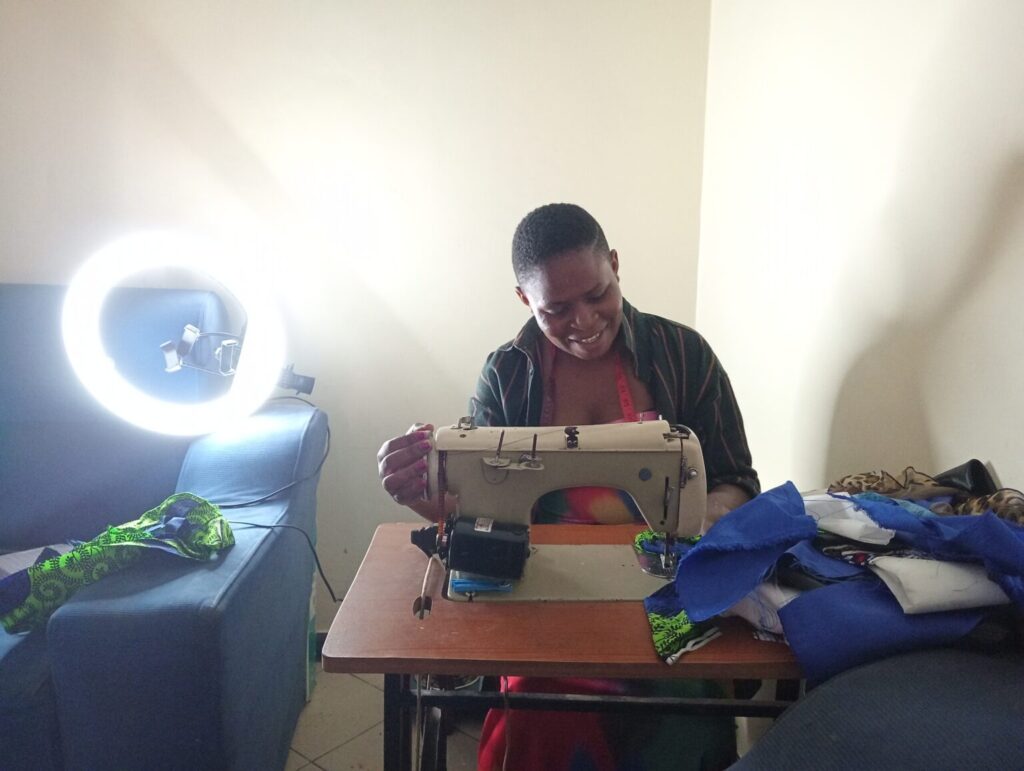
“Rent in Kampala is way too high, but it will not limit my creativity,” she says.
At the studio, Zahabu guides me through the process of producing one of her signature outfits, explaining how the digital landscape further influences the spread of Congolese style. As she multitasks, effortlessly recording her dressmaking session for her growing social media audience on @ZahabuCouture, she shows me that her online presence is her portfolio and diary to the business. There, she captures her journey in the competitive Kampala fashion scene. Through TikTok, she receives orders for different designs, especially her bestseller kimono, boubou and double-breasted robes.
“I dream of selling my designs to bigger fashion brands in Kampala,” she says. In Nsambya, the host community has grown to recognize and appreciate Zahabu’s talent.
Listen to Mama Neema (English):
Regional policies that encourage
The fashion and textile industry in Uganda faces high taxes, especially on the importation of fabrics. The charge of US$ 3.5 per kg of fabrics as import duty is often passed on to the consumer. This has limited competition among local fashion enterprises, including those run by migrants. The taxes are accompanied by complex customs procedures, which hinder cross-border trade, limiting Ugandan access to regional markets.
When the East African Common (EAC) Market Protocol came into effect in 2010, it promised seamless labour mobility across member states, a vision of open borders and shared opportunity. Despite the Protocol’s guarantees, Ugandan authorities still require citizens of East African Community (EAC) countries to obtain work permits.
For many aspiring workers, especially in the city’s bustling fashion and beauty industry, the process is slow, inconsistent, and expensive. This is particularly true for women like Bongo and Zahabu, working in the informal sector, whose contributions power much of East Africa’s creative and service economies. The EAC migration framework makes room for free movement but offers little in the way of clear protections or policies for intra-regional women migrants operating outside the formal economy.
However, the African Continental Free Trade Area (AfCFTA) agreement, on which Uganda is a signatory, mandates the gradual removal of tariffs on 90% of goods traded between member states. For developing countries like Uganda, the elimination process is over 10 years, and for non-low-developed countries (LDCs), five years.
The Regional Ministerial Forum on Migration for East and Horn of Africa, a growing multilateral initiative in its sixth year, also aims to reshape the narrative. Its core objective is to highlight and harness the developmental impact of labour migration in East Africa, advocating for policies that recognise migrant workers as catalysts for local economic growth.
As policy catches up with reality, more women crossing borders for work are beginning to find protection from the quiet legal, financial, and cultural barriers that once stood in their way.
Watch Zahabu Martha’s short story:
This content is produced as part of the Move Africa project, commissioned by the African Union Commission and supported by the Deutsche Gesellschaft fur Internationale Zusammenarbeit (GIZ) GmbH. The views and opinions expressed are those of the authors only and do not necessarily reflect those of the GIZ or the African Union.
